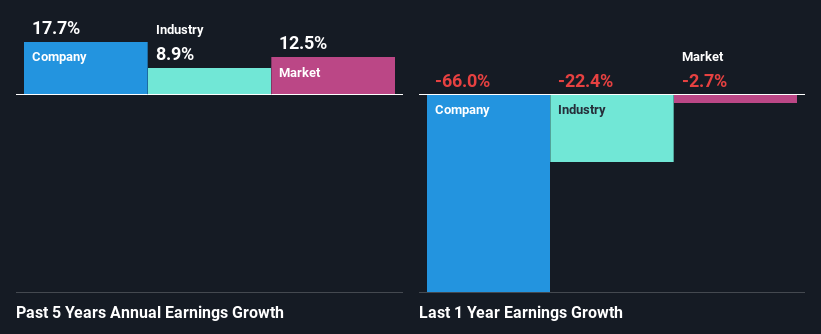Batu Kawan Berhad (KLSE:BKAWAN) Stock's Been Sliding But Fundamentals Look Decent: Will The Market Correct The Share Price In The Future?
Batu Kawan Berhad (KLSE:BKAWAN) has had a rough month with its share price down 2.3%. However, the company's fundamentals look pretty decent, and long-term financials are usually aligned with future market price movements. Particularly, we will be paying attention to Batu Kawan Berhad's ROE today.
ROE or return on equity is a useful tool to assess how effectively a company can generate returns on the investment it received from its shareholders. Put another way, it reveals the company's success at turning shareholder investments into profits.
Check out our latest analysis for Batu Kawan Berhad
How Is ROE Calculated?
The formula for return on equity is:
Return on Equity = Net Profit (from continuing operations) ÷ Shareholders' Equity
So, based on the above formula, the ROE for Batu Kawan Berhad is:
4.9% = RM848m ÷ RM17b (Based on the trailing twelve months to December 2023).
The 'return' is the income the business earned over the last year. One way to conceptualize this is that for each MYR1 of shareholders' capital it has, the company made MYR0.05 in profit.
Why Is ROE Important For Earnings Growth?
Thus far, we have learned that ROE measures how efficiently a company is generating its profits. We now need to evaluate how much profit the company reinvests or "retains" for future growth which then gives us an idea about the growth potential of the company. Assuming all else is equal, companies that have both a higher return on equity and higher profit retention are usually the ones that have a higher growth rate when compared to companies that don't have the same features.
Batu Kawan Berhad's Earnings Growth And 4.9% ROE
It is hard to argue that Batu Kawan Berhad's ROE is much good in and of itself. Further, we noted that the company's ROE is similar to the industry average of 5.0%. However, the modest 18% net income growth seen by Batu Kawan Berhad over the past five years is a positive sign. Considering the low ROE, it is quite possible that there might also be some other aspects that are positively influencing the company's earnings growth. Such as - high earnings retention or an efficient management in place.
We then compared Batu Kawan Berhad's net income growth with the industry and we're pleased to see that the company's growth figure is higher when compared with the industry which has a growth rate of 8.9% in the same 5-year period.
Earnings growth is an important metric to consider when valuing a stock. The investor should try to establish if the expected growth or decline in earnings, whichever the case may be, is priced in. By doing so, they will have an idea if the stock is headed into clear blue waters or if swampy waters await. Is Batu Kawan Berhad fairly valued compared to other companies? These 3 valuation measures might help you decide.
Is Batu Kawan Berhad Using Its Retained Earnings Effectively?
With a three-year median payout ratio of 38% (implying that the company retains 62% of its profits), it seems that Batu Kawan Berhad is reinvesting efficiently in a way that it sees respectable amount growth in its earnings and pays a dividend that's well covered.
Moreover, Batu Kawan Berhad is determined to keep sharing its profits with shareholders which we infer from its long history of paying a dividend for at least ten years.
Conclusion
On the whole, we do feel that Batu Kawan Berhad has some positive attributes. Even in spite of the low rate of return, the company has posted impressive earnings growth as a result of reinvesting heavily into its business. While we won't completely dismiss the company, what we would do, is try to ascertain how risky the business is to make a more informed decision around the company. Our risks dashboard would have the 3 risks we have identified for Batu Kawan Berhad.
Have feedback on this article? Concerned about the content? Get in touch with us directly. Alternatively, email editorial-team (at) simplywallst.com.
This article by Simply Wall St is general in nature. We provide commentary based on historical data and analyst forecasts only using an unbiased methodology and our articles are not intended to be financial advice. It does not constitute a recommendation to buy or sell any stock, and does not take account of your objectives, or your financial situation. We aim to bring you long-term focused analysis driven by fundamental data. Note that our analysis may not factor in the latest price-sensitive company announcements or qualitative material. Simply Wall St has no position in any stocks mentioned.

 Yahoo Finance
Yahoo Finance 
